‘BCN Comedy Vibes with Hannah Becker’ by Yulia Peelovesky
Welcome to our BCN Comedy Vibes, Fringe Edition. Get ready for a comedy deep dive where Hannah Becker spills the beans on everything from heckling etiquette to the art of making Eastern European audiences laugh without sending them into a contemplative silence. We’ll explore how comedians are navigating the cultural comedy minefield and how laughter really is the universal language.
We’ll also share some must-see acts that’ll have you giggling all the way home. So grab your popcorn, sit back, and prepare to learn how to laugh without causing a scene—stay tuned!
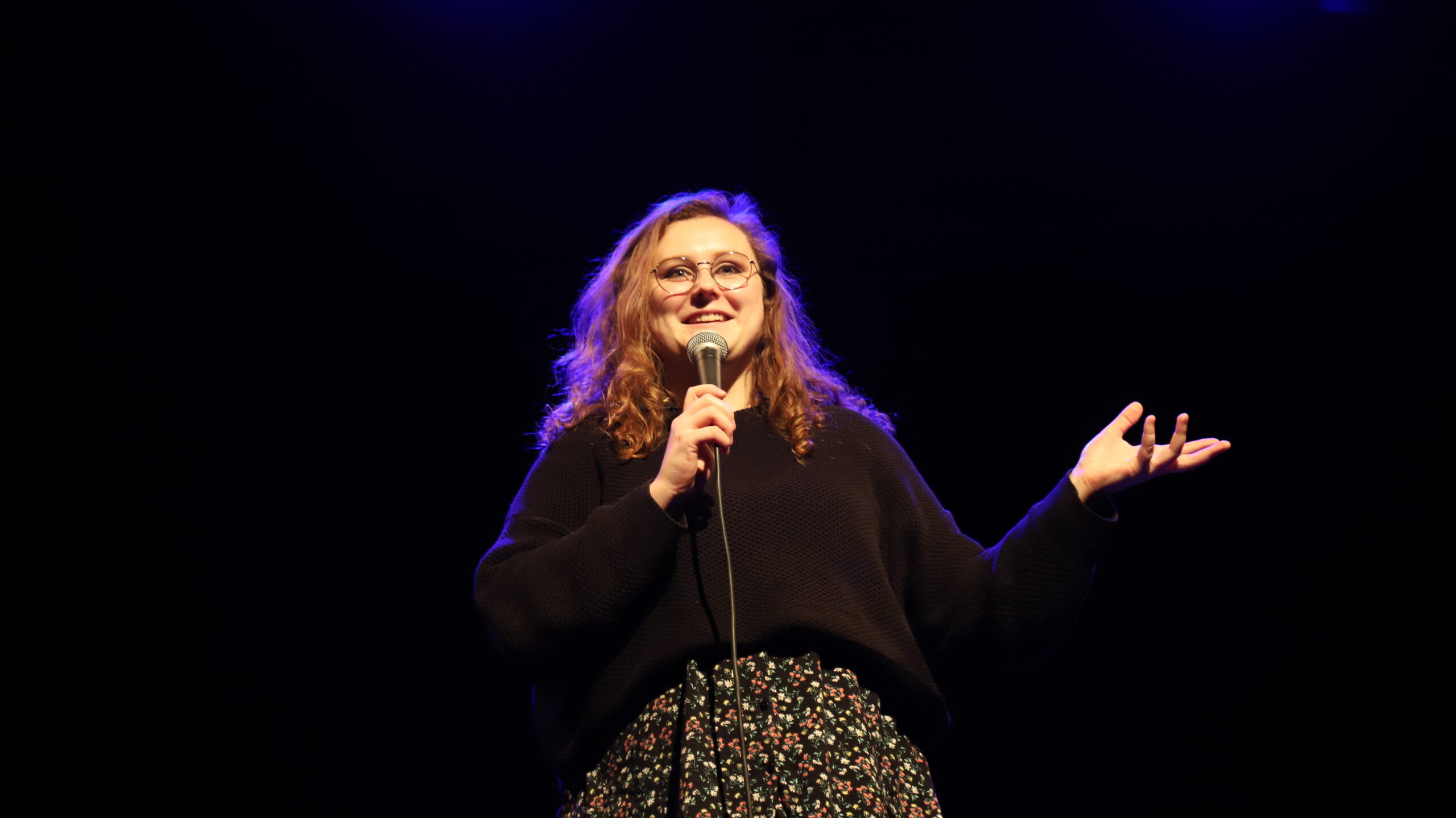
Yulia: So, Hannah, the Fringe in Barcelona. You’re a key organiser. How did the magic happen?
Hannah: We’ve been talking about this for a while. Barcelona is a destination for many, making it lucky for our Comedy Clubhouse.
Yulia: I left London with a feeling that for the beginners, there are more opportunities for bigger crowds in Barcelona. Is it just me?
Hannah: No, it’s true. In European cities with English comedy scenes, new comedians have great opportunities. In London and New York, everyone competes for TV spots. Here, the limit to what we can do makes it more welcoming. Barcelona is particularly open to newcomers, with a good grassroots open mic scene and community.
Yulia: There’s so much variety in shows. I learned my lesson once when I thought I could go to a show at Imprfcto Bar without a ticket, but it was full. I ended up drinking in a bar instead.
Hannah: Yes, we’re sold out often. On most Fridays, our 8 p.m. and 10 p.m. shows are full. People want to come out on weekends, and during the week, we’re still building it up. We’ve been discussing the Fringe because we thought it would be easy to attract people here, especially post-Edinburgh in the fall when some comedians from Australia or the U.S. are in Europe. November may be late, but if a U.S. or Australian comedian plans to do Edinburgh and a European tour, they can fit in Barcelona Fringe before the Australian festivals in January, February, and March.
The weather is usually nice in early November—not beach weather, but pleasant for someone from the U.K. And for the Fringe, cooler weather is preferable.
Yulia: Makes total sense.
Hannah: In Edinburgh, even in August, it feels like winter. People come here for a bit of sun, and it’s relatively cheap compared to the U.K. for food and outings. We believed the city could use a Fringe-style comedy festival.. People here often confuse comedy and Fringe festivals. In a comedy festival, a company organises shows and books lineups, telling performers, “You’re doing your hour.” A Fringe is performer-directed; you must be ready to sell your show, promote, and create ads. We provide a framework, locations, and organisational help and we set up all the tickets for performers. We are also promoting some stuff, but it’s mostly up to the performers to promote. We’re trying to involve more Spanish and Catalan comedians, but they’re confused about the process, asking, “When do I show up?” We say, “No, you need to send us your stuff and do your own promo.” We’re giving you guidelines, but you’re a part of the festival.
Yulia: Amazing.
Hannah: Yeah, there’s a compilation show with comedians from India, mixing Hindi and English (“Hinglish”). Next year, we’ll start sooner to get more local comedians, but this year was fast, so people were a bit surprised.
Yulia: It all happened so suddenly.
Hannah: Yeah, before the Edinburgh Fringe, in early summer, we thought about it, and I was like, “Let’s plan for November 2025.” Then it turned into, “We’re doing it this year.” John and James were like, “We can do this.” And we are doing it. It’s such a Clubhouse thing. Everything we do feels spontaneous yet manageable. We’re all comedians and creatives, not held back by strict logic—just driven by creativity.
Yulia: Wow. So, where are people coming from?
Hannah: We have someone from Canada, which is the furthest. People are coming from, Berlin, Prague, all over Europe, the UK, Ireland. It’ll be pretty international. Most Spanish and Catalan acts are local, but for English shows, we’ll have people from Amsterdam, Berlin, Prague, Switzerland—all the major English comedy scenes in Europe.
Yulia: What challenges do you face as a feminist comedian? Here and in other countries, like the US?
Hannah: We’re lucky in Barcelona to have so many good female comedians. It feels great to be a woman in comedy here. You don’t feel as much, “Oh God, people are grossed out or bored.” People support girly talk. I’ve been okay in other countries, too. In Prague, we did an all-female lineup show, and it was fun. Here, female comedians run a lot of shows. Even if there aren’t as many women as men, they’re often the first names you think of for a quality lineup. That’s less common in other scenes.
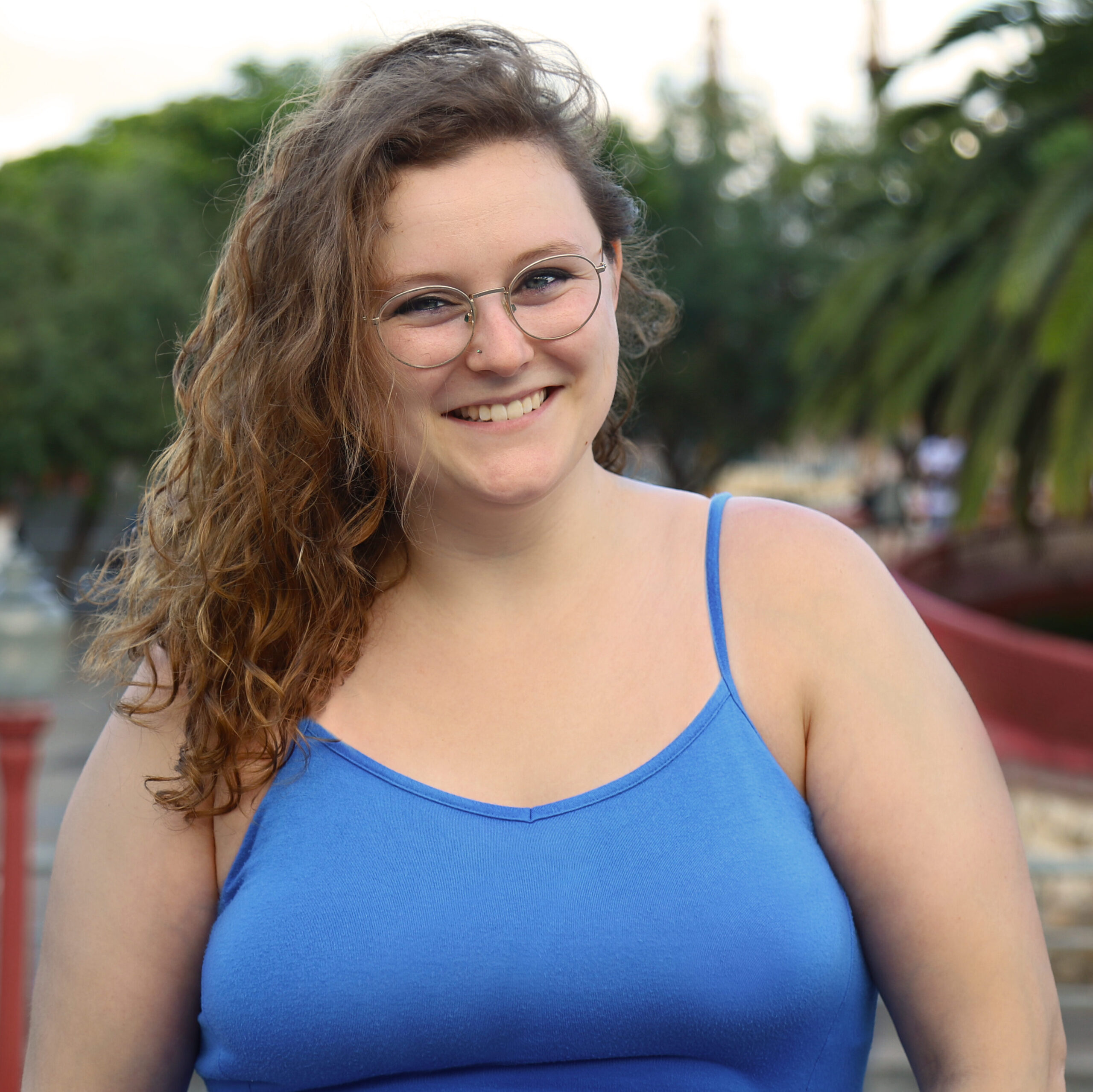
Yulia: Yeah.
Hannah: When I first started performing here and tried performing in Spanish, I felt, “Oh God, people are mad that a woman is on stage,” thinking, “She’s not even that hot, not showing cleavage … what am I looking at?” The Spanish and Catalan scenes have improved. More local women are excelling.
In other scenes, like in New York, I did an open mic at the Fat Black Pussycat, one of the Comedy Cellar venues. I asked the host, “Can I say ‘cunt’ on stage?” because in the US, people react to that word. It was the one curse word my mom didn’t allow. She said, “There’s no male equivalent of ‘cunt.’”
Yulia: Have you encountered prejudices from men in comedy? Or just regular guys? I went on a date once, and the guy told me, “You can either be pretty or funny.” I was like, “You’re 30, not my dad’s generation to say this crap!”
Hannah: Yeah, that’s his loss. Plenty of hot, funny women out there. Saying stuff like that just crosses him out. I feel it comes more from audiences, backhanded compliments: “Usually I don’t like female comedians, but you’re funny.” You think I’m an exception? You think that makes me happy?
I did a gig in Sitges that Chris runs, and a woman said, “You’re so funny. I’ve never found other female comedians funny.” I thought, you’re talking about my friends! They’re hilarious! It’s rude and unnecessary. I’m not the type of girl who says, “Oh my god, thank you. I’m better than those girls.” No, I’m a girl’s girl.
Yulia: That’s a good template for a response. How do you think the Fringe will impact the Barcelona comedy scene long-term? To me it’s like launching a rocket into space. In five years, it could be like Edinburgh. Am I too dreamy? Tell me your dreams, views, and practical thoughts.
Hannah: Trying to reach Edinburgh levels is ambitious. The Edinburgh Fringe takes over the city—every business thinks about August, either making money or struggling because of it. It’s a huge part of the city’s life. I don’t know if Barcelona could replicate that; it’s just bigger. Edinburgh feels more compact. A lot would need to happen with city support, and I’m unsure if Barcelona is interested, especially after their reaction to the America’s Cup. However, I think we could achieve more of a Brighton vibe, where it’s a destination for a couple of weekends on a smaller scale.
We’ve had people asking, “Is it too late to sign up?” I have to say, “Yes, sorry, but next year for sure.” We started late this year, so we’re saying, “Next year, we’ll do it differently.” We’re planning to allow more time for applications, getting sponsors, and involving locals by aligning with their 2025 plans. I hope this builds.
We’re also trying to connect the English scene with the local Spanish and Catalan scenes. There’s a lot of interest both ways. English-speaking comedians who know Spanish are nervous to try here, while local comedians want to try English. Every time I perform in Catalan, local comedians say, “I’d love to try it in English.” I encourage them, saying, “Yes, try it! We have chill open mics for just three minutes.” There’s space to experiment.
Local comedians consume a lot of English comedy, both British and American, so there’s definitely interest. I want to build more connections because comedy is a fun way to integrate with the local language and community if they welcome us.
We’re also trying to establish a name in the European comedy scene. Berlin has been the main scene; you can hit three open mics every night for a week with different audiences and venues. There’s so much happening. But we’re catching up.
Other scenes in Europe are doing more shows and making it more appealing for comedians to get stage time. In Barcelona, you can perform most nights but maybe not twice or three times a night. It’s even attractive for visiting open mic-ers because, unlike London or New York where stage time is hard to get or you have to pay to perform, here you can get a free drink for performing.
We’re building Barcelona as a comedy destination, not just for the Fringe but year-round. Every weekend, you can find good showcases with great comedians, and more visiting comedians are coming. Word of mouth is powerful; people hear about the Fringe, contact me saying, “Oh, I missed it,” and I say, “Try next year, but come anytime—we have showcases year-round.” We’re still figuring out how comedians can make more money here, which is a challenge.
Many comedians would love to come to Barcelona, do a few spots, and earn enough to cover expenses. If you headline Spotlight and do other spots, you could cover some of your costs. Our crowds are so supportive; it’s fun.
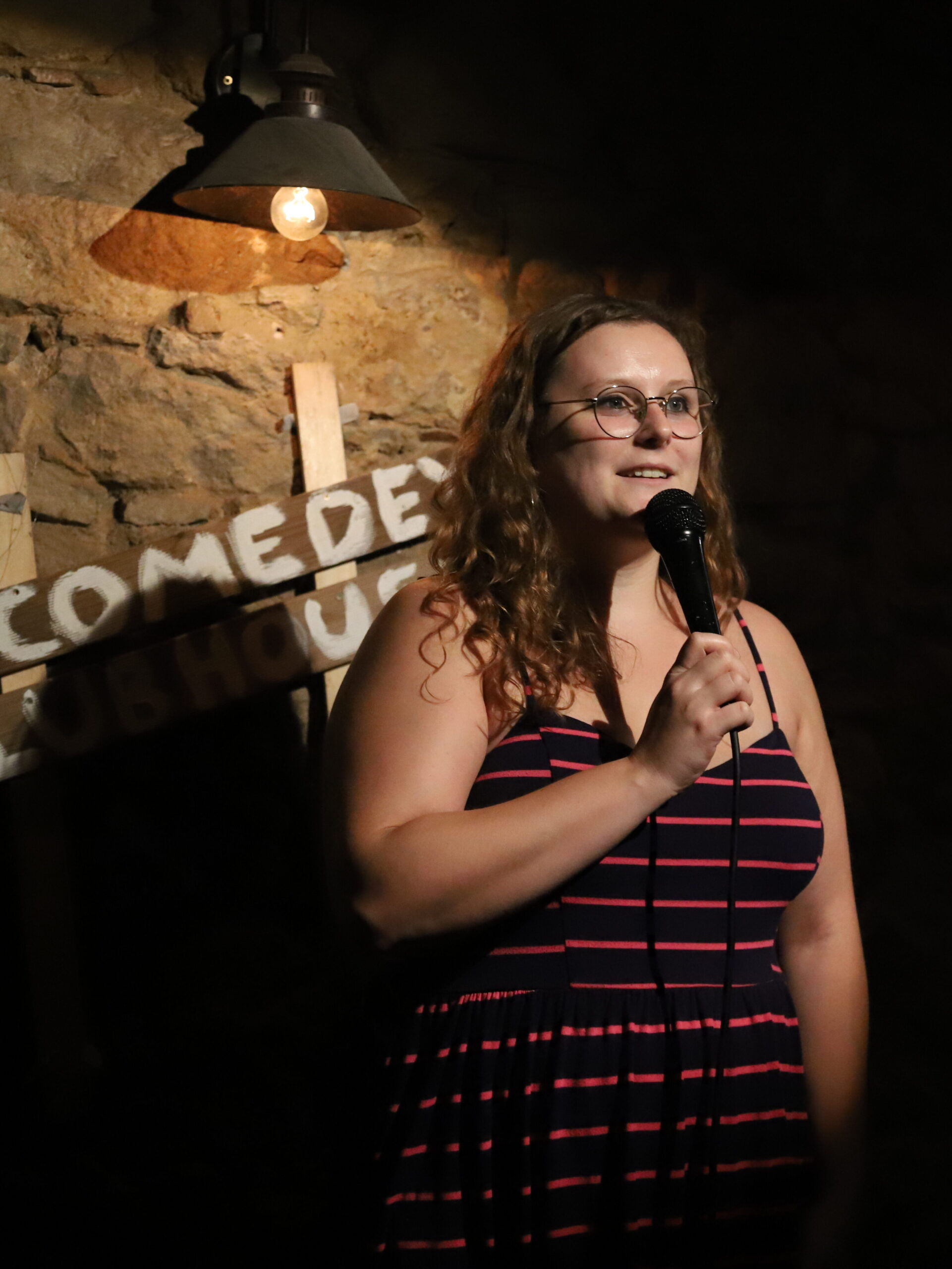
Yulia: I agree; traveling comedians deserve good ticket prices. Making money isn’t about staying in one place; it’s about traveling. Staying is fun but gets stale unless you’re producing new material constantly.
Hannah: Exactly. We want comedians to plan Barcelona as a stop when they tour Europe.
Yulia: There’s a drastic difference between working with Eastern European audiences and English-speaking audiences; our folks mostly don’t laugh. When it’s funny, you get clapping. It drained my energy. A year ago, when we just started stand-up in Ukrainian here, I realised we needed to start our shows with mini-workshops on how to laugh and not to heckle. Some come from cultures where laughing loudly seems foolish. Now, a year later, I see Ukrainian comedians coming to Barcelona, and audience behaviour is opening up. There’s a lot more laughter. Last time was really fun for me.
Hannah: Exactly. Performing in Barcelona has a unique culture. Most European cities have diverse audiences from different cultures, affecting how they laugh in public. I may be generalising, but I’ve noticed Eastern European audiences are very quiet initially. Once you engage them, it becomes a conversation, and they’ll share their life stories after a simple question.
Yulia: It’s typical behaviour, I’m afraid. I only learned about heckling and clapping from Chris’s comedy course myself. During class, on the stage, three years ago, Mila shared something about domestic violence that resonated with me, and I expressed my support with one sentence too many. She asked me not to heckle her. I asked, what’s heckling? I’m grateful she pointed it out. But most audience members didn’t go to comedy courses.
Hannah: Or you get audiences used to watching comedy on TV. They just sit there with their friends, commenting on everything. No, stop, we’re real. You can’t pause us and say, “Oh my god, that joke was so funny.” It’s not Netflix. Shut the fuck up.
Yulia: Oh my god, so true.
Hannah: With the Clubhouse, we’ve been training audiences a bit more. Hopefully, the Fringe will do that too. We want audiences to know how to behave at a comedy show, what to do, what to expect, and how to make it a good experience for everyone. I hope more people come next year. We’ll have a bigger budget for marketing and for getting more exciting names.
Yulia: Exactly. They say you have to start with something. This is not ‘something’; this is a lot of everything that you’ve started from. It’s a great start.
Hannah: It’s a lot of something. We focused on getting mostly English comedy people on board, the bigger producers and venues, while also branching out to local talent. We’re trying to make it as big as we can manage without spiralling out of control. It’s so much work and coordination, and we’ll definitely do things differently next year. Now we just have to finish this year.
Yulia: Amazing. I’m so excited for the Fringe. What are your recommendations for English-speaking comedians to watch at the Barcelona Fringe?
Hannah: Definitely the biggest show is at Golem’s. Michelle Wolf is headlining, and that will sell out. Marnie Manning is hosting, and we’ll have sets from Andre De Freitas, George Zacharopoulos, and Darrin Rose. Kyla Cobbler did her hour, which is the first show of the festival at the Clubhouse. Marnie Manning is also doing an hour. I’m excited to see her perform. Bone Man, Andy Casper’s clown show, Bone Man Rides Again, is different every time, and I hope to catch it one night. The Secret Comedy Club is doing most of the Spanish shows. In English, there’s a guy named Ignacio Lopez, who is half Spanish, half Welsh, based in London and starting to get TV appearances. Jamie Lerner is doing her hour, F*ck Tomorrow, and Luke Meginsky is doing his first hour, Impasta Syndrome.
Jordan Thomas Gray is making a mini-documentary about the Fringe. We’re definitely trying to create buzz, even if it’s after the fact, to say, “You missed it, it was great this year, but 2025 will be even better.” That’s helpful too.
Yulia: Thank you for your time, Hannah. Thank you for keeping us in the loop; this is so inspiring.
There’s so much more covered in our conversation, and we look forward to sharing the second part of our conversation with Hannah after the Fringe!
This interview was hosted by Yulia Peelovesky, your unofficial “BCN Comedy Vibes: Fringe” blabber, spreading laughter and insights one cool AF comedian at a time!

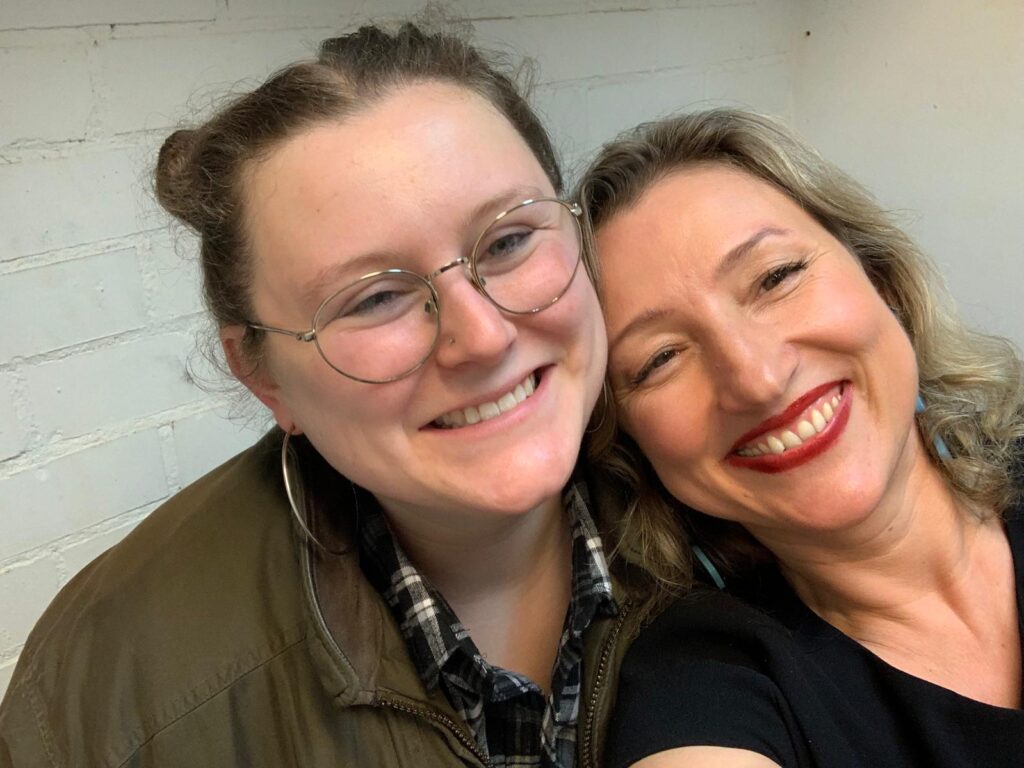
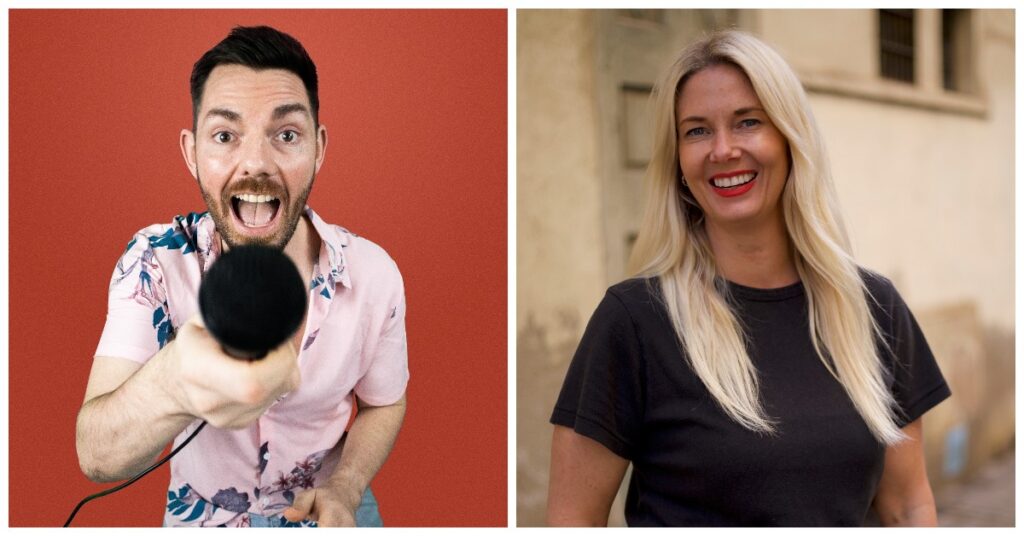
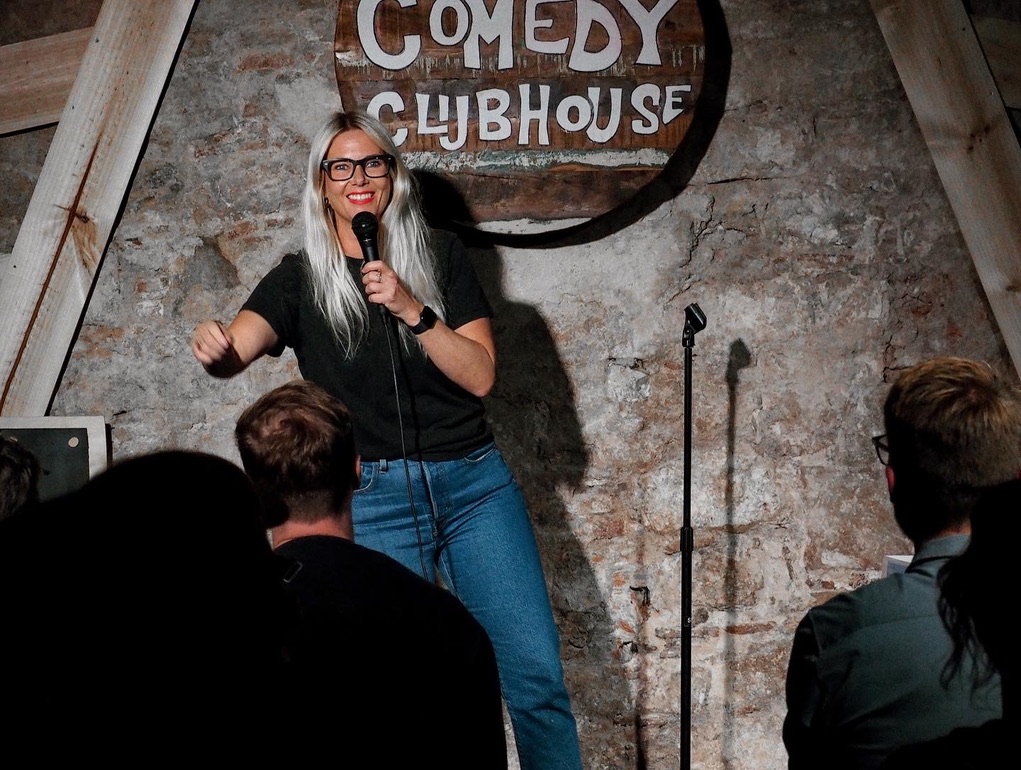

Great article about our busy bee in the comedy scene 😀